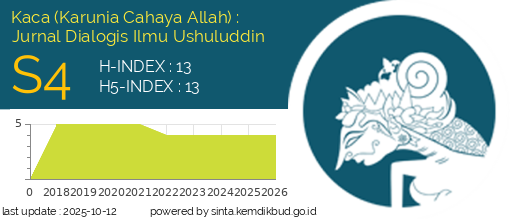Tariqa and Prosperity: Investigating Shiddiqiyyah Tariqa Experience in Empowering Communities in Jombang, East Java, Indonesia
DOI:
https://doi.org/10.36781/kaca.v13i2.498Abstract
This article describes the struggle of the Shiddiqiyyah to become a nationalist tariqa that teaches a balanced way of life. The research was conducted qualitatively. Data was collected by interviewing the murshid, three caliphs, and 20 tariqa followers, observing their activities, and documenting the doctrine and community empowerment activities. The collected data were analyzed using reflective-inductive thinking techniques to produce a systematic narrative about the movements of the Shiddiqiyyah tariqa. The results show that Shiddiqiyyah is a native Indonesian tariqa founded by Muchtar Mu’thi in Jombang, East Java, who struggled the tariqa to become a tariqa teaching the love of the motherland and dhikr of work. To realize this, first, the murshid of Shiddiqiyyah develops the doctrine of ‘unity of faith and humanity’ so that the tariqa adherents become humanity who are close to Allah through dhikr kautsaran and work creativity; second, holding training to cultivate local resources into goods of economic value such as bags, mats, and wallets.
[Artikel ini menjelaskan perjuangan tarekat Shiddiqiyyah untuk menjadi tarekat nasionalis yang mengajarkan cara hidup yang seimbang duniawi-ukhrawi. Penelitin dilakukan secara kualitatif. Data dikumpulkan dengan mewawancarai musrsyid, tiga khalifah, dan dua puluh pengikut tarekat; mengamati kegiatan warga tarekat; dan mendokumentasikan doktrin dan kegiatan pemberdayaan masyarakat. Data yang terkumpul dianalisis menggunakan teknik berpikir reflektif-induktif untuk menghasilkan narasi sistematis tentang program-program tarekat Shiddiqiyyah. Hasil penelitian menunjukkan bahwa Shiddiqiyyah merupakan tarekat asli Indonesia yang didirikanoleh Muchtar Mu’thi di Jombang, Jawa Timur, yang memperjuangkan Shiddiqiyyah untuk menjadi tarekat yang mengajarkan cinta tanah air dan dzikir kerja. Untuk mewujudkan hal tersebut maka, pertama, mursyid Shiddiqiyyah mengembangkan doktrin ‘kesatuan iman dan kemanusiaan’ agar penganut tarekat menjadi umat yang dekat dengan Allah melalui dzikir Kausaran dan kerja kreatif; kedua, mengadakan pelatihan untuk mengolah sumberdaya alam berupa daun pandan dan bambu menjadi produk barang bernilai ekonomi seperti tas, tikar, dan dompet.]
Downloads
References
Abdullah, Mukhammad. “Kontribusi Nilai-Nilai Keimanan dan Kemanusiaan Persaudaraan Cinta Tanah Air Indonesia.” TEOSOFI: Jurnal Tasawuf dan Pemikiran Islam 7, no. 1 (2017): 249–72.
A’dham, Syahrul. “Etos Ekonomi Kaum Tarekat Shiddiqiyyah.” Al-Iqtishad Journal of Islamic Economics 3, no. 2 (2011): 313–30.
Braun, Virginia, Victoria Clarke, Nikki Hayfield, dan Gareth Terry. “Thematic analysis.” Handbook of Research Methods in Health Social Sciences, 2019, 843–60.
Bruinessen, M. M. van. “The origins and development of Sufi orders (tarekat) in Southeast Asia,” 1994. https://dspace.library.uu.nl/handle/1874/20753.
Budhwani, Nadir N., dan Gary N. McLean. “The Roles of Sufi Teachings in Social Movements: An HRD Perspective.” Advances in Developing Human Resources 21, no. 2 (2019): 205–23.
———. “The Roles of Sufi Teachings in Social Movements: An HRD Perspective.” Advances in Developing Human Resources 21, no. 2 (Mei 2019): 205–23. https://doi.org/10.1177/1523422319827938.
Budi, Setiawan. “Peran Tarekat Shiddiqiyyah dalam Penanaman Nilai Nasionalisme Kepada Warga Tarekat Shiddiqiyyah Tahun 1970-2010 di Ploso Jombang.” Skripsi, Universitas Negeri Surabaya, 2016. https://core.ac.uk/download/pdf/230695938.pdf.
Chun Tie, Ylona, Melanie Birks, dan Karen Francis. “Grounded Theory Research: A Design Framework for Novice Researchers.” SAGE Open Medicine 7 (Januari 2019): 205031211882292. https://doi.org/10.1177/2050312118822927.
Djakfar, Muhammad. “Business Behavior of Tariqa Followers in Indonesia: The Relation of Religion, Sufism, and Work Ethic.” Ulul Albab 19, no. 2 (2018): 253.
Dodi, Limas. “Antara spiritualitas dan realitas Tarekat Shiddiqiyyah dalam bingkai fenomenologi Annemarie Schimmel.” Prosiding Nasional 1 (2018): 29–54.
Elwell-Sutton, L. P. “SUFISM AND PSEUDO—SUFISM.” Dalam Islam in the Modern World (RLE Politics of Islam), 49–56. Routledge, 2013. https://books.google.com/books?hl=en&lr=&id=AZQqAAAAQBAJ&oi=fnd&pg=PA49&dq=Sufism+and++Pseudo%E2%80%94Sufism&ots=xIHO-j5BcO&sig=PqtYe57riQ52-PULWXOii664xE8.
Fawait, Mohammad. “Etos Ekonomi Tarekat: Kajian Tentang Budaya Kerja Pengikut Tarekat Shiddiqiyyah di Kembang Kuning Surabaya.” UIN Sunan Ampel Surabaya, 2019.
Haq, Muhammad Itsbatul. “Tasawwuf (Sufism) as The Basis for Internalizing Humanist Character of Indonesian Muslims (Case Study of Pesantren in Yogyakarta and Madura).” Sunan Kalijaga: International Journal of Islamic Civilization 2, no. 2 (2019): 235–62.
Knysh, Alexander. “Sufism as an explanatory paradigm: the issue of the motivations of Sufi resistance movements in Western and Russian scholarship.” Die Welt des Islams 42, no. 2 (2002): 139–73.
Maarif, Muhammad Anas, dan Muhammah Husnur Rofiq. “The Role of Islamic Education Teachers in Improving the Character of Nationalism in Boarding School.” EDUKASI: Jurnal Pendidikan Islam (e-Journal) 6, no. 1 (2018): 64–78.
Masturin, M. “Khaul and Maqam Thariqath in Sufism: the Analysis of Implementation Inside the Live of Sufi Thariqath Naqshabandiyah at Dawe Kudus Boarding School.” Addin 12, no. 1 (2018): 221–40.
Maulana, Luthfi. “Theology of Humanity in the Sufism Community of the Sabbaqal Mufarridiyah Group in Pekalongan Indonesia.” Jurnal Penelitian, 2019, 25–36.
———. “Theology of Humanity in the Sufism Community of the Sabbaqal Mufarridiyah Group in Pekalongan Indonesia.” JURNAL PENELITIAN, 2019, 25–36.
Munir, Misbahul. “Internalisasi Modal Sosial dan Modal Spiritual dalam Perilaku Bisnis Warga Tarekat Shiddiqiyah di Kabupaten Jombang,” 2015. http://repository.uin-malang.ac.id/2162/.
Munji, Ahmad, dan Semih Çeyhan. “Ibn Arabi’s Influence on Ottoman Sufismin Üftade’s View.” Walisongo: Jurnal Penelitian Sosial Keagamaan 26 (2018). https://avesis.marmara.edu.tr/yayin/0c3f8b97-334c-4242-95be-7b170f27bce1/ibn-arabis-influence-on-ottoman-sufismin-uftades-view.
Rahmonova, Zulayho Jamolovna. “THE ENLIGHTENMENT OF CONVERSATION AND INTERCOURSE IN SUFISM (TASAWWUF).” ANGLISTICUM. Journal of the Association-Institute for English Language and American Studies 7, no. 9 (2018): 17–26.
Shams-ur-Rehman, Ghulam, Ghulam Fatima, dan Yousif Bin Naji. “The Role of the Sanῡsīyah in the Integration of Bedouin Tribes and National Cohesion of Libya.” Pakistan Journal of Social Sciences (PJSS) 31, no. 1 (2011). https://citeseerx.ist.psu.edu/document?repid=rep1&type=pdf&doi=0826c1216145755ec14de38a8e23162ababe042a.
Tedy, Armin. “Tarekat Mu’tabaroh di Indonesia (Studi Tarekat Shiddiqiyyah dan Ajarannya).” El-Afkar: Jurnal Pemikiran Keislaman dan Tafsir Hadis 6, no. 1 (2018): 31–42.
Trimingham, J. Spencer. The sufi orders in Islam. Oxford University Press, 1998. https://books.google.com/books?hl=en&lr=&id=NhXqWLd_AMQC&oi=fnd&pg=PR7&dq=The+sufi+orders+in+Islam&ots=6MugqciwW7&sig=p6A3us0ZUa9E7wShfGoI6PhSAYg.
Ueno, Manami. “Sufism and Sufi Orders in Compulsory Religious Education in Turkey.” Turkish Studies 19, no. 3 (27 Mei 2018): 381–99. https://doi.org/10.1080/14683849.2018.1438194.
Downloads
Published
How to Cite
Issue
Section
License
Copyright (c) 2023 Abd. Syakur

This work is licensed under a Creative Commons Attribution-ShareAlike 4.0 International License.









